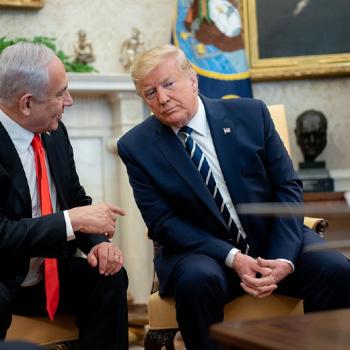Editors' Note: This article is part of a Public Square conversation on Political Engagement. Read other perspectives here.
The 2008 Proposition 8 campaign in California represented a high-water mark for the Church of Jesus Christ of Latter-day Saints—not since the 1970s had the Church become so publicly engaged with a politicized issue. Lower-profile efforts had been (and continue to be) standard operating procedure, and so the mobilization of Church members' time and money through letters read over the pulpit in sacrament meetings (i.e., the main Sunday worship meeting) was a departure from the norm. (The pro-Proposition 8 coalition also included Catholics, whose church spearheaded the effort, Protestants, Muslims, Jewish groups, and Evangelicals.)
The Church and its members received painful bruises from that episode, even though Proposition 8 passed by well over half a million votes. But the lessons the Church learned thereby are valuable, and will inform efforts under the divine mandate to "lift up your voice as with the sound of a trump, both long and loud, and cry repentance unto a crooked and perverse generation, preparing the way of the Lord for his second coming" (Doctrine and Covenants34:6). Given that mandate, the Church will always remain active on issues pertaining to the spiritual wellbeing of God's sons and daughters—even if these issues become politicized—for the Lord will hold the Church accountable for doing so. Nevertheless, here is an inventory of what lessons this observer believes were acquired from this experience.
First, since we have not seen similar public campaigns by the LDS Church in other states where same-sex marriage was subsequently put to a popular vote (Maine and Maryland in 2012), it is clear the Church has decided the high-profile approach was counterproductive. After all, Christ's injunction is to be "wise as a serpent and harmless as a dove" (Matthew 10:16), not "harmless as a dove and dumb as a rock." Those on the Lord's errand should strive to be as effective as possible, and that may entail making different choices from the Lord's "diversity of operations" (Doctrine and Covenants46:16).
Second, the Church appears to have made a strategic decision that there is a more important battle to be won than those fought over a single issue such as same-sex marriage. That is the battle for religious freedom—the right not to be punished by the state for teachings and practices that circumscribe acceptable behavior beyond that recognized in law. This does not mean that the Church will cease all efforts on those single issues; that would be inconsistent with its mandate to stand for truth. However, the very foundation upon which one stands for truth—the right to speak freely and the right to free exercise of religion—is clearly seen by the Church as being in jeopardy. This is why the Church has just launched a major new initiative on religious freedom, which includes videos, a Facebook page, and in-depth commentaries, among other resources.
The Church perceives, rightly in this observer's view, that religious freedom is an issue around which a broad consensus can still be built within American society. While religious Americans may no longer much care about the married lesbian couple in their subdivision, they still care whether they and the churches they attend will be punished for exhorting others not to follow that path. They rightly suspect that the day may come when calling something a "sin" or even "wrong" will be equated with "hate speech" under future legal interpretation.
For a Church whose God has commanded, "say nothing but repentance unto this generation" (Doctrine and Covenants 6:9), and proclaimed that it should teach "all nations, kindreds, tongues, and people" (Doctrine and Covenants 42:58), such developments would be anathema. The LDS Church will be very active and engaged on the issue of religious freedom, have no doubt.
Finally, there is a form of engagement that this observer hopes the Church will emphasize more than it has to date. While the Church has begun, through very successful ad campaigns such as "I'm a Mormon," to demonstrate that Mormons are normal people exhibiting a wide diversity of backgrounds, interests, and opinions, and while it musters abundant resources to make plain its beliefs (see, for example, Mormonism 101 FAQS), and even nuance its position on controversial issues (see, for example, its website on "Mormons and Gays,") perhaps one of the best forms of engagement is explanation. But ask any young person on the Brigham Young University campus, as I have, why the Church opposes same-sex marriage, or why women do not hold the priesthood, and there's not much of a response. That renders them mute when these issues are debated and discussed in the public square, a lamentable situation for them personally as well as for the Church. Church efforts to engage politicized issues should involve inculcating in its members a deeper understanding of their own doctrine, as well as the ability to share that understanding bilingually—to members and non-members of the Church alike.
11/19/2013 5:00:00 AM




